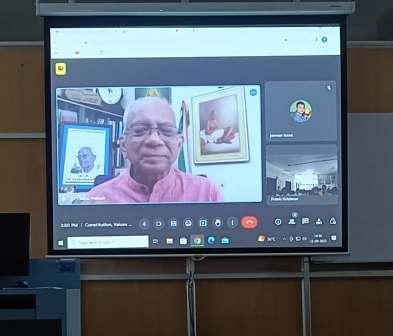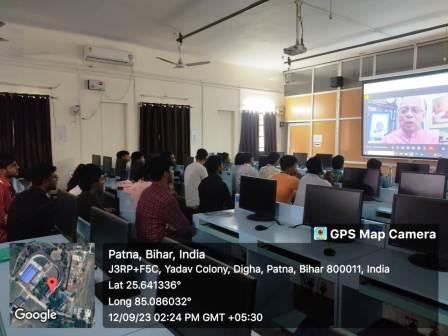Catholic students in a well known Jesuit College in Bihar may have been a bit surprised to see a Catholic Priest hold up the Constitution of India and say, “This is the most Sacred Book of the Citizen of India. Not the Bible, Not the Quran, Not the Bhagwad Gita.”
The priest who was addressing them was none other than the inimitable Cedric Prakash SJ, and the topic was ‘Constitution, Values, and Youth’. This online lecture was a part of the first ever 30 hour certificate course organised by the Signis BIJHAN region in collaboration with St. Xavier’s College of Management and Technology AICUF Unit, at Patna, the capital of Bihar.
Earlier this month, on the 6th of September, Signis Bijhan region [Bijhan stands for Bihar, Jharkhand, and Andamans] signed a five year memorandum of understanding [MOU] with SXCMT, Patna under which Signis, [the social communication wing of the Catholic Church] will jointly organize workshops, training and media skills programs for students, and also faculty development programmes.
A young woman in the audience told me later, ‘Fr. Cedric touched upon the non-negotiables in our Constitution, which are also non-negotiable values for all Indian Catholics: Justice, Liberty, Equality, and Fraternity. It made me think, because social justice is one of the planks of our AICUF movement: we are to try to bring justice to the unjust world. The non-negotiables are very close to what my personal faith is all about. Freedom is what the Lord gave us when he created man and women with Free Will. Equality is also very much there and standing up to caste based injustice or gender based injustice I feel is very much part of my being a Christian, and Fraternity means brotherhood and sisterhood, and i can relate it to the lines : Whatsoever you do to the least of my brothers and sisters, you do it to Me. So, I can easily agree that the Constitution is really a sacred book.
The Five C’s of Indian Reality Today
Fr Cedric unleashed a selection of ‘C’s that so aptly described the Indian Reality in a capsule. India reality today is the mainstreaming of Communalism, Corruption, Casteism, Criminalisation, and Consumerism. Akash, a first year student told me that it is difficult to speak freely even with classmates, because one does not know whether they are RSS supporters or they are anti-minority. ‘When you see your classmate shouting Jai Shree Ram slogans outside the college, You feel very insecure, even frightened,’ he said.
When Fr Cedric mentioned about the emergence and dominance of mono-culture and majoritarianism as part of the ‘New India’ propaganda, I was reminded of what a young Anglo-Indian student had shared with me a couple of days ago. She said this: ‘When I suggested that we have at least one English reading during our Holy Mass in the college AICUF Unit, the suggestion was laughed off.’ And this leads to a question about whether we are quick to point out mono-culture and majoritarianism in political spheres, whereas in our own region, and in our own church-based organisations, we are snuffing out the linguistic and cultural minorities in our own parishes?
That’s a question I will be leaving you with, as I have to start cooking a very late dinner.
I will return to this topic soon, because what happened during that one hour session, needs to be discussed, and followed up on.



